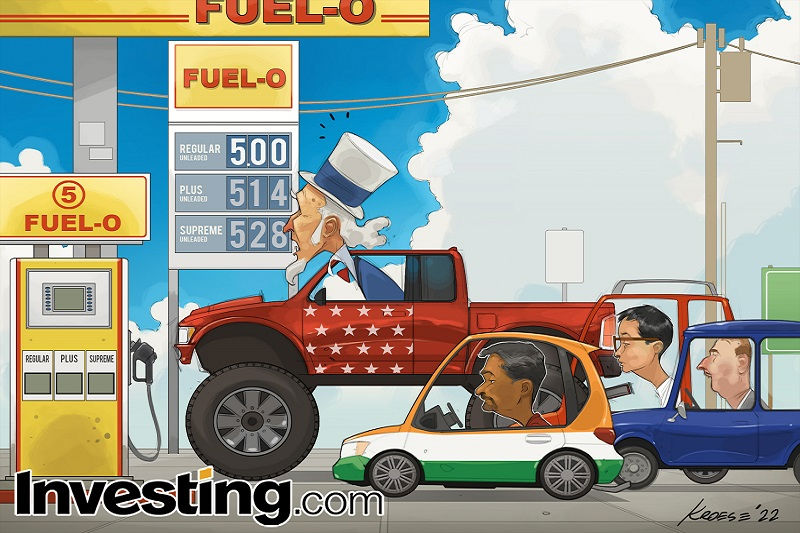By Geoffrey Smith
Investing.com -- The pain of high oil prices is being felt around the world and, as so often before, it looks like the only cure for high prices is…high prices.
In nominal prices at least, Gasoline prices are at record highs. Crude oil, meanwhile, touched $120 a barrel on Monday. These are not prices that either producing or consuming nations consider sustainable. Historically, they are prices that have quickly led to demand destruction and a sharp economic slowdown, if not outright recession.
The fundamental factors that brought the world market to where it is now look unlikely to improve much in the coming months.
Shanghai appears to have overcome its Covid-19 outbreak, allowing the most important economic hub in the world’s largest oil importer to return to normal life. Elsewhere, the release of travel demand, pent up during two years of lockdowns, is leading airlines across North America and Europe to increase their flying schedules for the summer. The International Energy Agency said in its latest monthly report that it expects global oil demand to rise by some 3.6 million barrels a day between April and August.
Nor is there much hope for relief on the supply side: the G7 group of major western economies remains intent on punishing Russia for its invasion of Ukraine, limiting the amount it can sell on world markets. The European Union finally secured agreement late on Monday for an embargo on Russian crude and fuel imports from the end of the year. Pipeline imports to Hungary, Slovakia and Czechia will be exempted, but these account for only around 250,000 barrels a day, barely one-tenth of normal Russia-EU flows.
That puts European buyers into a bidding war for African and Middle Eastern crude that would normally go to Asia or North America. It also raises the likelihood of large amounts of Russian output being taken off the market entirely due to export bottlenecks, despite signs of progress in finding alternative buyers in China and India.
Russian oil output has recovered a little after falling by more than 1 million barrels a day in April, but it remains well below its prewar level and below what it pledged to produce under its agreement with the Organization of Petroleum Exporting Countries. With export terminals and storage tanks unable to discharge into waiting tankers, Russia will have to shut down more and more productive oilfields.
The Oxford Institute for Energy Studies reckons this could result in the loss of 4 million b/d of output from prewar levels by the end of the year. And for now, at least, OPEC is refusing to abandon its new ally and raise output by more to compensate. Saudi Aramco (TADAWUL:2222) CEO Amin Nasser indicated last week that that might not even be possible, saying that there was only 2 million barrels a day of spare capacity that could be activated in an emergency.
Even if Russia can find other buyers, the western sanctions are baking huge extra costs into the world energy market. Forcing over 10% of world output to take longer, more expensive routes to market, when prices are already painfully high, is a recipe for disaster. India’s Energy Minister said last week that benchmark prices of $110 a barrel were “unsustainable”. Many more in his position must think the same.
New threats seem to appear daily: at the weekend, Iran seized two Greek-flagged tankers in the Strait of Hormuz at the entrance to the Persian Gulf, the global oil market’s most important choke-point. Further out, the administration of President Joe Biden is set to re-enter the market as a buyer in the fall, having reduced the U.S. Strategic Petroleum Reserve as far as prudence would allow when prices were spiking in March.
And all this is happening at a time when advanced economy inventories are at their lowest (for the season) in eight years and U.S. shale producers – are still largely content to pocket the windfall of high prices rather than raise their own output.
In short, barring another collapse in Chinese demand due to more Covid outbreaks, there is little on the horizon to stop the short-term supply-demand imbalance from getting worse in the near term. Market forces are going to have to do the rebalancing.
That means potentially destabilizing levels of economic pain across the world. Fuel is already at levels where – in the past – British and French drivers have started refinery blockades or other actions.
Their effect on energy-importing emerging nations is likely to be even more explosive. They have already played a big role in the wave of riots seen in Sri Lanka this year. Even where civil disobedience is less likely, high prices threaten to be a liability for any ruling party facing elections, as the U.S. Democratic Party does in November.
